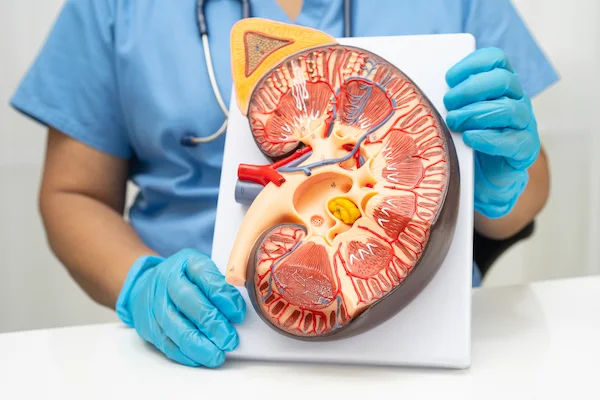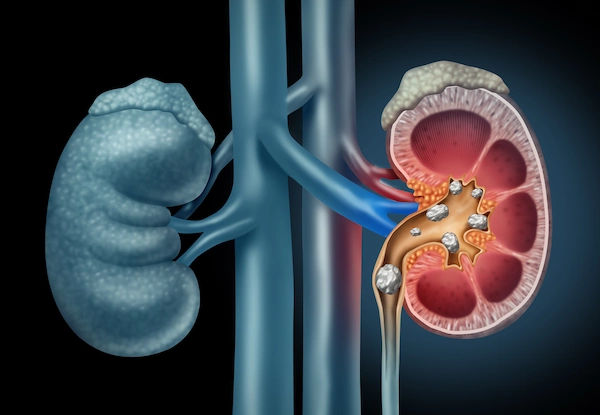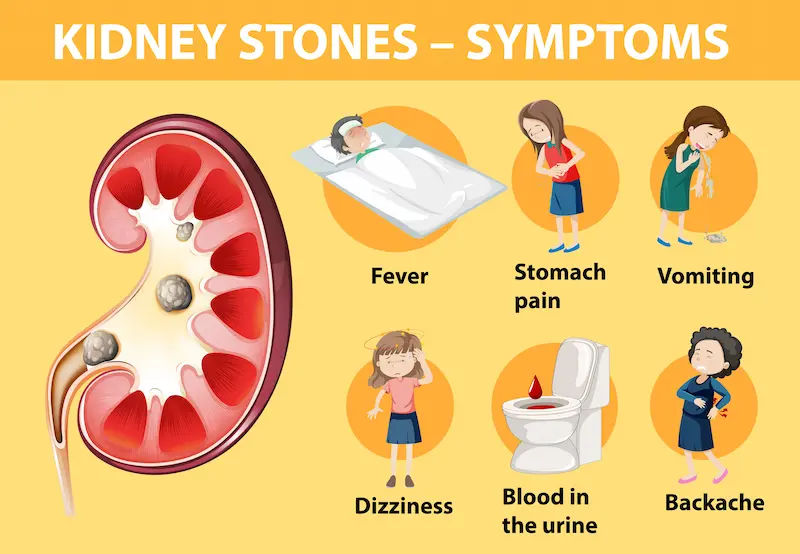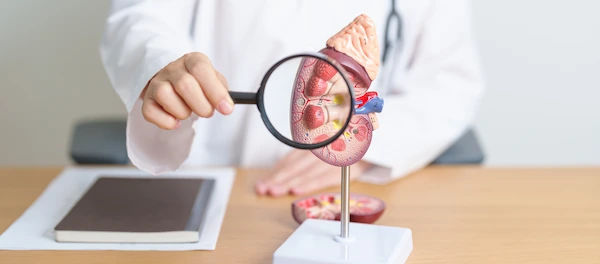Guide to Apple Cider Vinegar Effective Dissolving Kidney Stones
Discover how apple cider vinegar can be a natural ally in dissolving kidney stones. Our comprehensive guide explains the science, provides practical tips, and shares precautions for using ACV effectively and safely.


Introduction
The excruciating pain of a kidney stone is an experience no one wants to repeat. As people search for natural ways to manage and prevent this condition, one remedy consistently surfaces: apple cider vinegar (ACV). Touted for its myriad health benefits, from aiding digestion to balancing blood sugar, ACV has also gained popularity as a potential ally in the fight against kidney stones. But does it live up to the hype? This guide cuts through the noise to explore the science, the benefits, and the significant risks of using apple cider vinegar for kidney health. We'll provide a balanced view, combining traditional wisdom with modern medical advice, to help you understand if this pantry staple could be a helpful part of your prevention strategy and when it's absolutely essential to seek professional care from a platform like Apollo24|7.
Understanding Kidney Stones: The Root of the Problem
What Are Kidney Stones?
Kidney stones are hard, crystalline mineral deposits that form inside your kidneys. They develop when your urine contains more crystal-forming substances—such as calcium, oxalate, and uric acid—than the fluid in your urine can dilute. At the same time, your urine may lack substances that prevent crystals from sticking together, creating an ideal environment for stones to form. Passing these stones can be notoriously painful, often compared to childbirth, as they travel through the narrow urinary tract.
Common Types of Kidney Stones (Focus on Calcium Oxalate)
The most prevalent type of kidney stone is the calcium oxalate stone, accounting for about 80% of cases. These form when calcium combines with oxalate (a substance found in many foods like nuts, spinach, and chocolate) in the urine. Understanding this type is crucial because it directly relates to the proposed mechanism of how apple cider vinegar might work. Other types include uric acid stones, struvite stones, and cystine stones, each with different causes and treatments.
Traditional Medical Treatments
Standard medical treatments for kidney stones depend on the stone's size and location. Small stones often pass with increased water intake, pain medication, and alpha-blockers to relax ureter muscles. For larger stones, procedures like Extracorporeal Shock Wave Lithotripsy (ESWL) to break stones with sound waves, ureteroscopy, or percutaneous nephrolithotomy (surgery) may be necessary. If you suspect you have a kidney stone, it is critical to consult a doctor online with Apollo24|7 for a proper diagnosis and treatment plan rather than relying solely on home remedies.
Consult Top Specialists for Personalised Tips
The Science Behind Apple Cider Vinegar and Kidney Health
The Power of Acetic Acid
The primary active compound in apple cider vinegar is acetic acid, which is responsible for its strong sour smell and potential health properties. Acetic acid is thought to help break down and dissolve small kidney stones, making them easier to pass. Some proponents suggest that the acid can soften the hard outer layer of a stone, but robust human clinical trials are lacking to confirm this effect definitively.
The Citric Acid Controversy and Connection
Interestingly, while ACV contains acetic acid, the gold-standard dietary recommendation for preventing calcium stones is citric acid, found abundantly in lemons and limes. Citrate binds to calcium in the urine, preventing the formation of calcium oxalate crystals. While ACV does contain small amounts of citric acid, it is not a significant source. Lemon juice is a far more potent and recommended source of citrate for kidney stone prevention. This is a key differentiator often missed in discussions about ACV.
Alkalizing the Body: Myth or Reality?
A common claim is that despite being acidic, ACV has an "alkalizing" effect on the body once metabolized. The theory is that by making urine less acidic (more alkaline), it creates a less hospitable environment for certain types of stones, particularly uric acid stones. However, the body's pH is tightly regulated, and the impact of dietary changes on blood pH is minimal. The effect on urine pH is more variable and not fully proven for ACV.
Potential Benefits of Using ACV for Kidney Stones
May Help Dissolve Small Stones
Anecdotal reports and some preliminary theories suggest that the acetic acid in ACV could help break down the mineral composition of very small, existing stones. Users often describe adding ACV to their water when they feel the initial twinges of pain, claiming it helps the stone pass more smoothly and with less discomfort. It is crucial to state that this is not a guaranteed or scientifically proven method for dissolving kidney stones.
Could Prevent New Stone Formation
As a supportive measure, ACV might play a role in prevention. By potentially influencing urine chemistry and providing a small amount of citrate, it could, in theory, help reduce the risk of crystal aggregation. However, this should be viewed as one small part of a much larger prevention strategy focused overwhelmingly on hydration and dietary management.
Soothing Pain and Discomfort
While it won't stop the physical passing of a stone, some find that an ACV tonic can have a mild anti-inflammatory effect that takes the edge off the accompanying discomfort. Staying hydrated with the ACV mixture also ensures a strong urine flow, which is essential for moving the stone along.
How to Use Apple Cider Vinegar Safely and Effectively
Choosing the Right ACV: With 'The Mother'
For potential health benefits, always choose organic, unfiltered, and unpasteurized apple cider vinegar that contains "the mother." The mother is a cloudy, cobweb-like substance composed of proteins, enzymes, and friendly bacteria that are believed to be responsible for most of its health claims. Bragg's is a widely available and popular brand that fits this criteria.
ACV Drink Recipe for Kidney Stone Support
If you and your doctor decide trying ACV is appropriate, never drink it straight. Always dilute it to protect your tooth enamel and esophagus.
Recipe: Mix 1-2 tablespoons (15-30 ml) of raw apple cider vinegar in 8 ounces (240 ml) of warm or cool filtered water.
Optional Add-ins: Add a tablespoon of fresh lemon juice (for a citrate boost) and a teaspoon of honey or a dash of cinnamon to improve the taste.
Recommended Dosage and Timing
There is no universally agreed-upon dosage. Most recommendations suggest the mixture above taken once or twice daily, preferably before meals. Start with a lower dose (1 tablespoon) to see how your body reacts. It is not advised to exceed 2 tablespoons per serving. Consistency is key for any potential preventive benefits.
Important Risks and Precautions You Must Know
Tooth Enamel Erosion
The acidity of ACV is strong enough to erode tooth enamel, the protective outer layer of your teeth. Always dilute it in water and consider drinking it through a straw to minimize contact with your teeth. Rinse your mouth with plain water afterward and wait at least 30 minutes before brushing your teeth.
Throat Irritation and Esophageal Damage
Undiluted ACV can cause burns and irritation to your throat and esophagus. This is a significant risk and the primary reason dilution is non-negotiable.
Drug Interactions (e.g., Diuretics, Insulin)
ACV can interact with certain medications:
Diuretics (like Lasix): Can lower potassium levels; ACV may exacerbate this.
Diabetes medications (Insulin): ACV may lower blood sugar, potentially leading to hypoglycemia.
Digoxin (Lanoxin): Low potassium levels can increase the risk of side effects from this heart medication.
Who Should Avoid ACV? (e.g., low potassium, digestive issues)
Individuals with already low potassium levels (hypokalemia), those with gastroparesis (common in diabetics), and people with stomach ulcers or severe acid reflux should avoid ACV, as it can worsen these conditions.
Beyond ACV: Proven Strategies to Prevent Kidney Stones
Hydration is Non-Negotiable
This is the single most important factor in preventing kidney stones. Aim to drink enough water to produce at least 2.5 liters of urine per day. Your urine should be light yellow or clear. Adequate fluid intake dilutes the substances in urine that lead to stones.
Dietary Modifications (Low Oxalate, Reduced Sodium)
Reduce Sodium: A high-salt diet increases the amount of calcium in your urine.
Limit Animal Protein: Red meat, poultry, and fish can increase uric acid levels and reduce citrate.
Manage Oxalate-Rich Foods: If you form calcium oxalate stones, your doctor may advise moderating foods like spinach, nuts, tea, and chocolate. Do not cut out calcium-rich foods, as dietary calcium binds to oxalate in the gut and prevents it from entering the kidneys.
The Role of Calcium and Other Nutrients
Getting the right amount of calcium from food (not supplements) is protective. Citrate (from lemons/limes) is highly recommended. In some cases, a doctor may prescribe potassium citrate supplements.
Consult Top Specialists
What Does the Research Say?
Review of Existing Scientific Studies
Direct research on ACV for kidney stones in humans is extremely limited. Most evidence is anecdotal or based on historical use. Studies on acetic acid show some antimicrobial and antioxidant properties, but its specific efficacy for dissolving kidney stones has not been proven in large-scale, randomized controlled trials—the gold standard of medical research.
The Verdict from the Medical Community
The mainstream medical community does not endorse ACV as a treatment for kidney stones. Urologists emphasize proven methods: hydration, dietary changes, and, when necessary, medication. While ACV is likely safe for most people when diluted and used in moderation, it should be considered, at best, a complementary support and not a cure. If your condition does not improve after trying these methods, book a physical visit to a doctor with Apollo24|7 to explore medical treatment options.
Quick Takeaways: Key Points
Apple cider vinegar is not a proven cure for kidney stones but may offer supportive benefits for prevention.
Its acetic acid content is theorized to help break down small stones, but citric acid (from lemons) is more proven for prevention.
Always dilute ACV in water (1-2 tbsp per 8 oz) to prevent damage to teeth and the esophagus.
ACV can interact with medications like diuretics and insulin and is not safe for everyone.
The most effective way to prevent stones is to stay intensely hydrated.
Do not reduce dietary calcium; instead, manage sodium, animal protein, and oxalate intake.
Always consult a healthcare professional for diagnosis and treatment of kidney stones.
Conclusion
Navigating the world of natural remedies requires a balance of open-mindedness and healthy skepticism. While apple cider vinegar has a place in wellness culture and may provide supportive benefits for some, it is not a magic bullet for kidney stones. The intense pain of a stone demands a professional medical approach for safe and effective treatment. Think of ACV not as a standalone solution, but as a potential small piece of a much larger puzzle—a puzzle that is predominantly solved by drinking plenty of water, eating a balanced diet, and following the expert guidance of a healthcare provider. If you are prone to stones, make an appointment with a urologist or consult a doctor online with Apollo24|7 to create a personalized, evidence-based prevention plan that works for you.
Consult Top Specialists for Personalised Tips

Dr Divya Lekha Gunta
General Practitioner
10 Years • MBBS, MD (Pathology)
Visakhapatnam
Apollo 24|7 Clinic - Andhra Pradesh, Visakhapatnam

Dr. Rajib Ghose
General Physician/ Internal Medicine Specialist
25 Years • MBBS
East Midnapore
VIVEKANANDA SEBA SADAN, East Midnapore

Dr. Ramya Hari
General Practitioner
18 Years • Medical Head & Family Physician, DG Shipping Approved Doctor, Panel Physician - UK Visa Medicals
Chennai
Apollo Medical Centre Kotturpuram, Chennai

Dr. Subashini Venkatesh
General Physician/ Internal Medicine Specialist
25 Years • MBBS., DCH, MRCGP, Dip (Dermatology), CCT
Chennai
Apollo One Chennai, Chennai
(25+ Patients)

Dr. M C S Reddy
General Physician/ Internal Medicine Specialist
9 Years • MBBS, MD (Gen. Med.), Dip.Diabetoogy, IDCC
Nellore
Apollo Speciality Hospitals, Nellore
Consult Top Specialists

Dr Divya Lekha Gunta
General Practitioner
10 Years • MBBS, MD (Pathology)
Visakhapatnam
Apollo 24|7 Clinic - Andhra Pradesh, Visakhapatnam

Dr. Rajib Ghose
General Physician/ Internal Medicine Specialist
25 Years • MBBS
East Midnapore
VIVEKANANDA SEBA SADAN, East Midnapore

Dr. Ramya Hari
General Practitioner
18 Years • Medical Head & Family Physician, DG Shipping Approved Doctor, Panel Physician - UK Visa Medicals
Chennai
Apollo Medical Centre Kotturpuram, Chennai

Dr. Subashini Venkatesh
General Physician/ Internal Medicine Specialist
25 Years • MBBS., DCH, MRCGP, Dip (Dermatology), CCT
Chennai
Apollo One Chennai, Chennai
(25+ Patients)

Dr. M C S Reddy
General Physician/ Internal Medicine Specialist
9 Years • MBBS, MD (Gen. Med.), Dip.Diabetoogy, IDCC
Nellore
Apollo Speciality Hospitals, Nellore
More articles from Kidney stones
Frequently Asked Questions
How long does it take for apple cider vinegar to dissolve a kidney stone?
There is no reliable timeframe as it is not a proven treatment. The passing of a stone depends on its size, location, and your hydration levels. ACV should not be relied upon to dissolve a stone in a specific period.
Can I take apple cider vinegar pills instead of liquid for kidney stones?
Pills are not recommended. They have been linked to throat burns and esophageal damage if the pill gets stuck or dissolves slowly. They also lack regulation regarding their actual ACV content. The liquid form, properly diluted, is a safer choice.
What are the first signs of a kidney stone?
Early signs can include severe pain in the back or side below the ribs, pain that radiates to the lower abdomen and groin, painful urination, pink, red, or brown urine, cloudy or foul-smelling urine, and a persistent need to urinate
Is lemon juice or apple cider vinegar better for kidney stones?
For proven preventive benefits, lemon juice is superior. It is a much richer source of citric acid, which is clinically recognized for binding to calcium and preventing the most common type of stone (calcium oxalate) from forming.
What can I drink to flush a kidney stone fast?
Water is the best and most important drink. Aim for 2-3 liters per day. Additionally, sugar-free lemonade or limeade can provide citrate, and some herbal teas like dandelion root or nettle leaf are traditionally used to support urinary tract health.




.webp)